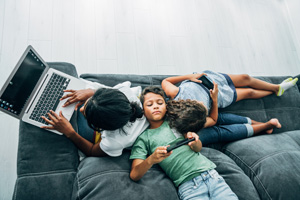The COVID-19 pandemic changed our children’s relationship with digital devices and media as families became more dependent on them for connection and education.
As schools begin opening in various ways, many continue to rely on digital media for at-home learning or hybrid in-school/at-home schedules. It’s natural that parents are concerned their children are using too much digital media and could develop poor social skills.
A recent study may offer some reassurance that this added time on screens may not have lasting effects on social skills.
Understanding the challenge of digital media
“Screen time problems run along a spectrum of severity,” Martin L. Kutscher, MD, and Natalie Rosin, CASAMHC, tell readers of Attention magazine in Too Much Screen Time? “At the mildest end are the problems we perceive among typical, well-functioning children and teens, such as texting multiple times an hour or ignoring friends and family at get-togethers in favor of communicating elsewhere with their smartphone. At the most severe end, there are those who suffer from what can be called a true internet addiction: an inability to control one’s digital or internet behavior despite significant resultant problems such as falling grades, withdrawal from friends and activities, and significant family turmoil.”
Digital devices have now become part of how children read, socialize, learn, and work with fellow students. Before the pandemic, schools were using computers and tablets for instruction and homework, requiring students to log in to school websites. Now, schools are using those same learning platforms to provide at-home education.
For children and teens with ADHD, the difficulties that arise through overuse of digital media can be compounded by their symptoms of distractibility, impulsivity, or novelty-seeking. However, in areas where youngsters cannot visit in person, social media platforms and video conferencing have become digital hangouts for them. Removing these ways to connect would separate them from friends who offer support to one another at this time. Of course, parents must remain aware of whomever their children socialize with online.
Social skills and screen time
A study at The Ohio State University compared children’s use of screens between cohorts who entered school in 1998 and cohorts who entered school in 2010. The researchers focused on teacher evaluations in addition to information from parents.
“There’s very little evidence that screen exposure was problematic for the growth of social skills,” says Douglas Downey, PhD, lead author of the study and professor of sociology at OSU. “Overall, we found very little evidence that the time spent on screens was hurting social skills for most children.”
The study also showed that teacher evaluations of children’s interpersonal skills and self-control tended to be slightly higher for those in the 2010 cohort than for those in the 1998 group.
Children’s media use during the pandemic
Computer and tablet use are a necessary part of life for most families right now. Parents can set limits, though, while recognizing how these devices are needed for learning and socializing.
“I have two suggestions for screen time for kids with ADHD during the quarantine,” writes child clinical psychologist Randy Kulman, PhD. “First, create clear expectations for daily non-screen activities such as regular exercise, chores, hands-on projects, and outdoor time. Second, loosen the reins. A little excess screen time will not hurt now and probably not in the future. But be strategic, so that more screen time improves household sanity, reduces stress, and allows all of you to get your work done. Permitting extended time for screens should have some caveats that can make it healthier and more productive.”
Dr. Kulman also suggested parents keep clear expectations for non-screen activities.
“Helping kids with ADHD to establish routines for exercise, chores, hobbies, and creativity will assist them when they are no longer quarantined,” he writes. “You’ll have to work hard to make these activities engaging. You might need to purchase some fun board games or new Lego sets, get food to engage kids in a cooking project, or take a drive in order to have a new place to go hiking.”
It’s okay for parents to allow more screen time during the pandemic, says Dr. Kulman, but having clear limits is healthy.
“Be open, yet strategic about allowing more time,” he says. “Tell the kids what you are doing and why you are letting them spend more time on screens. At the same time, create clear expectations that the additional free time due to the quarantine is for much more than being glued to a screen.”
Read more:
- Are Cell Phone and Social Media Use Causing ADHD? No Evidence
- Help! My Child is Addicted to Video Games
- Too Much Screen Time?
- Media Use in School-Aged Children and Adolescents
- Children and Adolescents and Digital Media
How do you help your children practice healthy digital media use?

